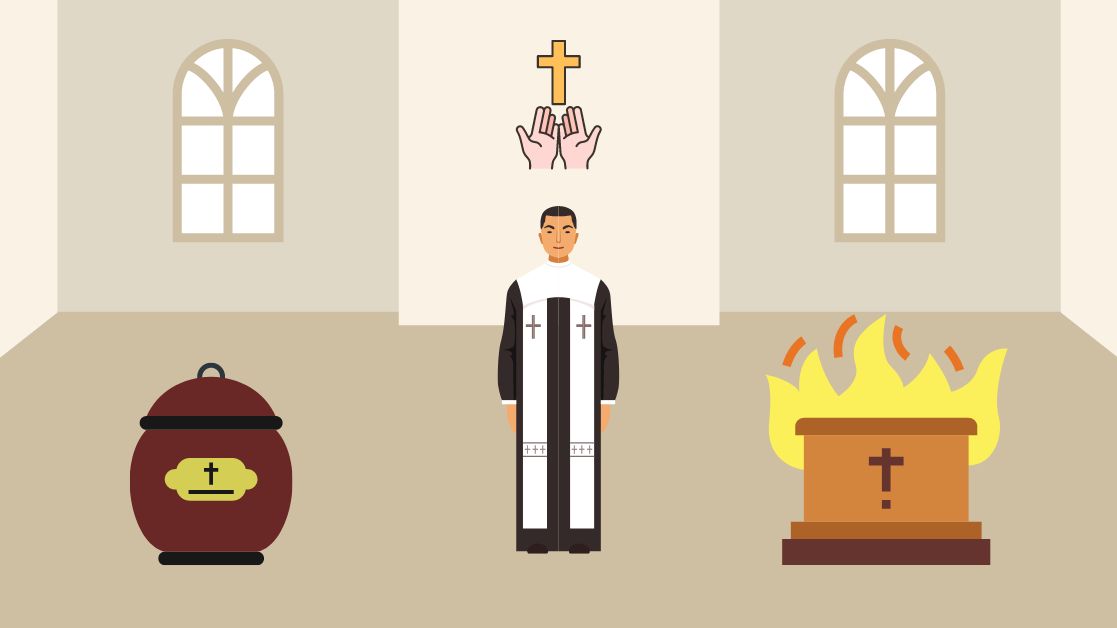Cremation is not classified as a sinful activity in the Bible. To be honest, the subject is not even included in the exhaustive lists of guidelines for life and dying provided by the Almighty God in the Old and New Testaments.
There is no direct prohibition against cremation in the Bible. Because cremation disregards the idea that God will one day raise our bodies and reconnect them with our spirits, some Christians are opposed to the practice. (1 Corinthians 15:35-58; 1 Thessalonians 4:16)
What Does the Bible Say About Cremation?
The first mention of cremation is in 1 Samuel 31, where Saul and his sons are burned, followed by the burial of their remains.
Amos 2:1 and Amos 6:8–10 are the only additional mentions. Since cremation involves deadly punishment that calls for the culprit to be “burned with fire,” Leviticus 20:14 only alludes to it in passing. However, the Old Testament makes over 200 allusions to burial, indicating that this was the accepted practice at that period. A person’s body was typically buried in a tomb, cave, or ground in ancient Israel (Genesis 23:19; 35:19; 2 Chronicles 16:14; Matthew 27:60-66).
What is Cremation and How It Is Related to The Bible?
Cremation is a funeral rite that involves the use of extreme heat to break down a human body to its basic components, primarily leaving only the bones. The remnants of these bones are commonly known as cremains or ashes.
This incineration process takes place within a specifically designed chamber, often referred to as a retort, which is an enclosure typically lined with fire-resistant materials. The temperature within this space typically ranges from 1800°F to 2000°F.
The body of the deceased is respectfully positioned within the chamber, usually in a wooden or cardboard casket. Within a few hours, intense heat reduces the body to fragments of bone and vaporizes the rest. After the cremation process, any remaining metal parts such as screws, nails, surgical pins, or titanium prosthetics are manually removed or extracted with a magnet by a crematory staff member.
These bone fragments are then processed into a fine powder with a specialized machine. The cremains are returned to the family of the deceased in a plastic bag, which is typically placed in an urn or a temporary cremation container.
The practice of cremation has various interpretations within the context of the Bible. While the Bible doesn’t provide explicit instructions about cremation, it primarily describes burial as the common practice at the time. This has led some Christians to prefer traditional burial.
However, many other Christians view cremation as an acceptable practice as the Bible does not explicitly forbid it. It’s important to note that beliefs may vary among different Christian denominations and individual interpretations.
Why Are Cremations Becoming More Popular Among Christians?
Saving money on funeral and burial costs is a common reason why more Christians are choosing cremation. While the typical cost of a cremation is $1,500 to $2,500, a traditional funeral can frequently cost between $8,000 and $10,000. The price of purchasing burial sites and digging a grave are additional expenses. Each costs about $1,000.
Bottomline
So, what does Bible say about cremation? In the end, the central biblical focus is the resurrection of the body and eternal life, not the specific method of body disposition.
It makes little difference whether a cherished one is cremated, buried, or planted in a pod to grow into a tree. In Job 34:14–15, Job repeated the dying moments of the body, “Dust to dust, ashes to ashes.”
In the event of the second coming, God will raise his people. Funerals are occasions for the living to honor the lives of their departed loved ones. It is an opportunity to reflect on, appreciate, and commemorate their lives. It serves as a reminder that God is ultimately in control of us. He gave us the ability to breathe and the bodies that house our spirits. He will appear to us in person one day with a brand-new body that will last forever.




